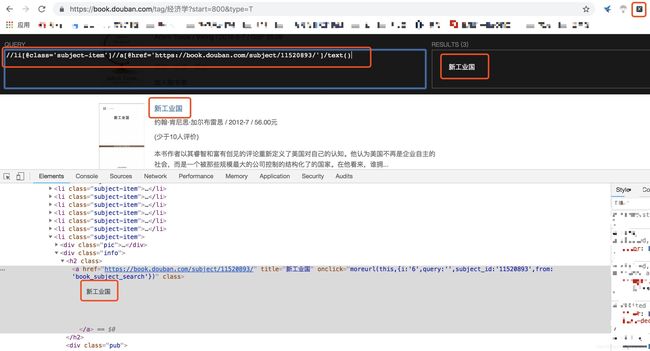Python爬虫实例(六):爬取XX网站图书的xml格式数据(xpath应用)
本文结合之前的练习,完成项目目标:爬取XX网站的经济学图书xml格式数据。
项目思路
发送get请求获取响应,使用xpath方法和etree.HTML方法提取想要的内容,保存至本地html文件;再从本地html文件读取出来进行处理或分析。
该项目用到的新工具和新方法:
1、Chrome的xpath插件工具:从网上下载xpath插件工具,并添加到Chrome。成功添加后,Chrome浏览器的右上角会出现如下图类似的图标,点击后就可以调用上方的黑色查询工具,找到所需信息的路径。xpath是用一种类似目录树的方法来描述在xml文档中的路径。xpath的语法这里不做详细说明,请参考其他资料。
2、html.xpath()方法,用来提取xpath路径中的内容。如果路径中最末尾不带/text(),则返回的是对象;如果带/text(),则返回的是文本(可能是字符串,也可能是含字符串的列表)
3、lxml.etree.HTML()方法,将
项目开头导入所需模块
# 【加载所需模块】
import requests
from lxml import etree
import os
import json
定义html_abs_path是xpath绝对路径,用来对获取的内容进行分组,将每一页的20本图书信息分成20条记录。(上面的图中,一条
发送get请求后获取到内容,则对内容进行解析。如果翻页后网页显示“没有找到符合条件的图书”,则在程序主体中停止循环(注意网页中虽然显示有200+页,但实际搜索并没有那么多)。否则,则对分组后的内容进行提取,并定义一个空字典dict_str来存放每一条图书信息,每一个字典又作为一个元素不断追加到空列表s_1中。
class DoubanEconomyBookSpider:
def __init__(self):
self.tmp_url = 'https://book.douban.com/tag/%E7%BB%8F%E6%B5%8E%E5%AD%A6?start={}&type=T'
self.headers = {'User-Agent': 'Mozilla/5.0 (Macintosh; Intel Mac OS X 10_13_6) AppleWebKit/537.36 (KHTML, like Gecko) Chrome/71.0.3578.98 Safari/537.36'}
self.html_abs_path = "//li[@class='subject-item']"
self.file_name = 'DoubanEconomyBookSpider.html'
def web_request(self, url, headers):
response = requests.get(url, headers=headers)
res_dec = response.content.decode()
return res_dec
def parse_date(self, html_abs_path, html):
s_1 = []
item_list = html.xpath(html_abs_path)
list_is_none = lambda x: x[0] if x else ""
if html.xpath("//div[@id='content']//p[@class='pl2']/text()") == ["没有找到符合条件的图书"]:
pages = -1
else:
pages = int(html.xpath("//div[@class='paginator']//a[@href='/tag/经济学?start=4140&type=T']/text()")[0])
for content in item_list:
dict_str = {}
dict_str["title"] = list_is_none(content.xpath(".//div[@class='info']//a/@title"))
dict_str["rating_num"] = list_is_none(content.xpath(".//div[@class='star clearfix']/span[@class='rating_nums']/text()"))
dict_str["comment_num"] = list_is_none(content.xpath(".//span[@class='pl']/text()")).strip().strip('()')
dict_str["link_src"] = list_is_none(content.xpath(".//a[@class='nbg']/@href"))
dict_str["pub"] = list_is_none(content.xpath(".//div[@class='pub']/text()")).strip()
s_1.append(dict_str)
return s_1, pages
定义save_data函数,将解析后的数据保存到本地文件中。保存前需对一些网页异常数据进行必要处理。
def file_exit_dec(self, file_name):
try:
os.remove(file_name)
except IOError:
print('File does not exit, now you can rewrite the file.')
def save_data(self, file, data):
if data:
data_tmp = str(data).strip('[]').replace("}, ", "},\n") + ",\n" # 去除首尾的[],将空格替换为换行(一条信息一行),每页数据最后加上","分隔
data_w = data_tmp.replace('\"[美]', '[美]').replace("\"China's Economy\"", "\'China s Economy\'") # 处理异常数据
# print(data_w)
with open(file, 'a', encoding='utf-8') as f:
f.write(data_w)
else:
pass
在程序主体run()中定义一个循环,while循环中利用start变量指示每一页第一条信息的序号,并用它去构造新的url地址,然后发送新的请求,直到循环结束。
def run(self):
# 0、数据准备
headers = self.headers
start = 0
count = 20
pages = 3
html_abs_path = self.html_abs_path
file = self.file_name
self.file_exit_dec(file)
while start < count * pages:
# 1、准备url
url = self.tmp_url.format(start)
# 2、发送请求,获取响应
res_dec = self.web_request(url, headers)
# 3、提取数据
html = etree.HTML(res_dec)
dict_str, pages = self.parse_date(html_abs_path, html)
# pages = 5
# 4、保存数据
self.save_data(file, dict_str)
# 5、准备下一次url
start += count
self.extract_data(file, 'title')循环结束后(数据已保存到本地html文件中),则是对数据进行处理、分析。extract_data可以将html文件中想要的ele_name信息读取出来,以供后续处理(例如将数据放到DataFrame中进行处理、分析、建模等,本文省略了这一步)。
def extract_data(self, file, ele_name):
with open(file, 'r') as a:
list_1 = a.read().replace('\'', '\"').rstrip(",\n").split(",\n") # 单引号转换为双引号,去除末尾的",\n",以",\n"分隔
for cont in list_1:
list_2 = json.loads(cont)[ele_name]
print(list_2)
if __name__ == '__main__':
example = DoubanEconomyBookSpider()
example.run()下图一是保存到html文件中的数据,每条图书信息对应一个字典,总共有998条数据。下图二则是调用extract_data()函数提取到的图书标题,根据输出到控制台的内容,可以得知已经成功爬取、保存和提取到想要的数据了!!
如果觉得内容不错,请扫码关注微信公众号,获取更多内容
![]()


